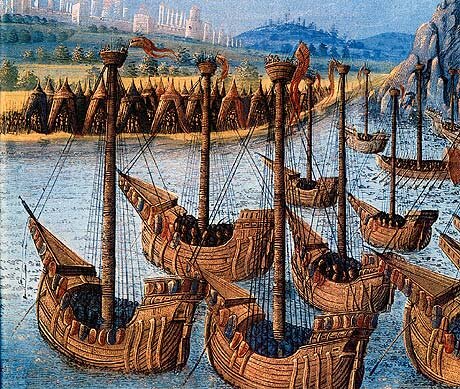Jeanne de Clissone
It was a cold, gray, rain-soaked day towards the end of the year 1346 when the heavy wood-and-iron doors of the Lord’s keep were slammed open with a jarring amount of force. A pair of guards quickly escorted two badly-wounded men out of the rain into the darkly-lit Great Hall, hurrying them forward with a sense of urgency. The men were pitiful to see – stripped of their weapons, armor, and uniform insignia, and bleeding from cuts and bruises across their bodies, their eyes held the gaze of men who have witnessed untold horrors without even beginning to know how the hell to process their reality. With a heavy sigh, and the urging of the Baron, the two exhausted French sailors began relating their story.
There had been black ships on the horizon. Three of them, almost-mystically appearing through of the thick fog on the English Channel like ghosts emerging from the veil of death itself. Crimson sails, red as blood, propelled the terrifying through the water with inescapable speed. The Baron’s men had done what they could. Archers launched fire arrows. Armored marines came to grapples with sword, spear, and axe. But in the end, the ferocity of the terrifying pirate fleet was too much. They were overrun in minutes.
Then she came. The Pirate Queen of Hell. Calmly striding along the deck, dragging a fearsome, well-worn axe behind her. She picked out the leader, her men pushed him down to the deck, and she lopped off the man’s head like she was prepping a fucking pineapple for a badass pirate pina colada.
She picked out these two men by hand, pointing to them seemingly at random. Her men immediately went to work decapitating every other surviving member of the crew.
Before heading below decks to check the hold for treasure and plunder, the Pirate Queen looked both survivors in the eye with a cold, hateful stare. You have been left alive, she said, to tell your King that La Tigresse Bretonne has claimed another of his ships.
Congreve was right. Hell hath no fury like a woman scorned. King Philip the Fortunate probably would have been wise to consider that before illegally arresting and executing Lady Jeanne de Clisson’s husband, confiscating her land, and declaring her an outlaw to the French crown.
Jeanne-Louise de Belleville was born in the year 1300, the daughter of a noble family from Britanny, which is that little pointy peninsula on the northwest tip of France. At the ripe old age of fucking twelve she was married off to a 19 year old French nobleman named Geoffrey, and went off to live in his awesome manor. They had two kids together, but he died in 1326, and four years later Jeanne was married again – this time to a dashing, handsome, super-rich French nobleman named Olivier III de Clisson. By all accounts Olivier was as close as I think you’re gonna get to true love in the Feudal System, and this guy had an awesome-as-hell castle outside Nantes that overlooked a scenic river and I don’t know I guess some cows or a pretty green field or something.
The Lord and Lady Clisson were obviously pretty happy in their Brittany villa, because they had five kids, didn’t end up having to butcher anyone with an axe, and don’t really do anything historically noteworthy between 1326 and 1343. Their castle still stands to this day, and, I don’t know, I wouldn’t mind spending a summer here:
Unfortunately, life in paradise came crashing down to a pretty abrupt end pretty fucking quickly.
The Hundred Years’ War broke out between England and France in 1337, and even if you don’t know shit about the Hundred Years’ War, you can probably use context clues and the powers of deduction to figure out that it lasted about a hundred damn years, so it’s probably pretty safe to say it was a fairly horrific and intense situation for both sides. At its core, the Hundred Years’ War was a stupid argument over who should be the King of France after the old King of France died without leaving an heir. Well, Lord Olivier III of Clisson sided with the King Philip the Fortunate of France at first, signing on as a badass knight and leading a cavalry attack against the English invaders, but King Edward of England used the power of persuasion and probably a fuckton of gold to convince Olivier that yeah, maybe he should side with England instead. Olivier stopped sending troops to Philip the Fortunate, Philip got mad and had his guards arrest Olivier while the Lord of Clisson was attending a jousting tournament in Nantes. Philip and a small group of nobles went For the Watch on Olivier’s ass, declared him a traitor to the crown, hung him, then cut off his head and hung it from the walls of Nantes. Then Philip wrote up a decree that Jeanne was a traitor like her husband, and he ordered her to be arrested and have all of her property confiscated.
When Lady Clisson received word of her husband’s death, the 43 year-old widow didn’t break down. She didn’t weep uncontrollably, pop some alprazolam and put on all of her Morrisey albums. She grabbed her axe, a suit of armor, ordered her chamberlain to sell every valuable thing she had, packed her seven kids up in a ship, and sailed it right to the fucking gates of Nantes. When she got there, she had her kids come out and see their father’s head mounted on the walls of the city. Do not forget this. Do not forgive this. Seek vengeance at all costs.
I don’t know what music was playing while this happened, but I bet it was fucking epic.
Jeanne de Clisson sold all of her land, jewels, and worldly possessions, and used the money to buy three massive warships. She painted them black, outfitted them with blood-red sails, hired crews of bloodthirsty marauders, and used the extra cash to bribe the Lords of Brittany not to sell her out to the King.
Then she went to work.
It’s uncertain how long the Tigress of Brittany (Sorry dudes, I know she’s known as the “Lioness of Brittany”, but that’s not the correct translation of the word tigresse, which means “tigress” and/or “fierce, passionate woman”) marauded, pillaged, raped, murdered, decapitated and otherwise horrifically massacred every French vessel in the Channel. Estimates range anywhere from five months to two years. It doesn’t matter – consider that Blackbeard’s entire career in piracy lasted for less than two years and you realize that a pirate armada can do a fucking lot of damage in a very short amount of time.
Her mission was simple – attack anything with a French flag. They took the head of her lover, so now she was going to rain down so many fucking decapitated heads that they’d with they’d never heard of an executioner’s axe. She personally whacked the commander and any noblemen on board, chopping off their heads and throwing the bodies overboard. Her crew would kill any other survivors, but they would always leave two men alive to tell King Philip the Fortunate what had happened.
To make shit even worse for him, Philip the Fortunate couldn’t do much to stop this raiding fleet, either. Most of the French fleet had been annihilated by the English at the Battle of Sluys in 1340, and in 1343 he couldn’t exactly spare the troops, money, or supplies that would be necessary for an expedition to chase a trio of pirate ships all around the western coast of France.
It wasn’t long before the Black Fleet’s reign of destruction caught the eye of King Edward of England. Ed was super into the fact that Jeanne didn’t attack English ships, so he actually ended up granting her land, titles, and money to thank her for her help clearing the Channel of the enemy. She repaid his debt by ferrying supplies, men, and arrows from England to France to help support the English during the Battle of Crecy.
We all know how most pirate stories end (with our hero swinging from the end of a noose), but fucking Jeanne de Clisson doesn’t go down that way. Instead of finally paying the price for her terrifying killing spree, she actually marries an English Lord in 1349, settles down in a sweet castle somewhere on the coast of Brittany, outlives Philip the Fortunate, and dies peacefully sometime around 1359. Her son Olivier IV inherited her estate. He was a charming boy, took after his mother, and is known to history as “Olivier the Butcher” for his badassitude on the battlefield.
Olivier eventually re-took the castle that had once belonged to his mother and father, and, as I said, the building still stands to this day (the French Resistance used it as a fortress to fight the Nazis during World War II, which is awesome).
The spirits of the tortured lovers are said to haunt the ruins to this day.








